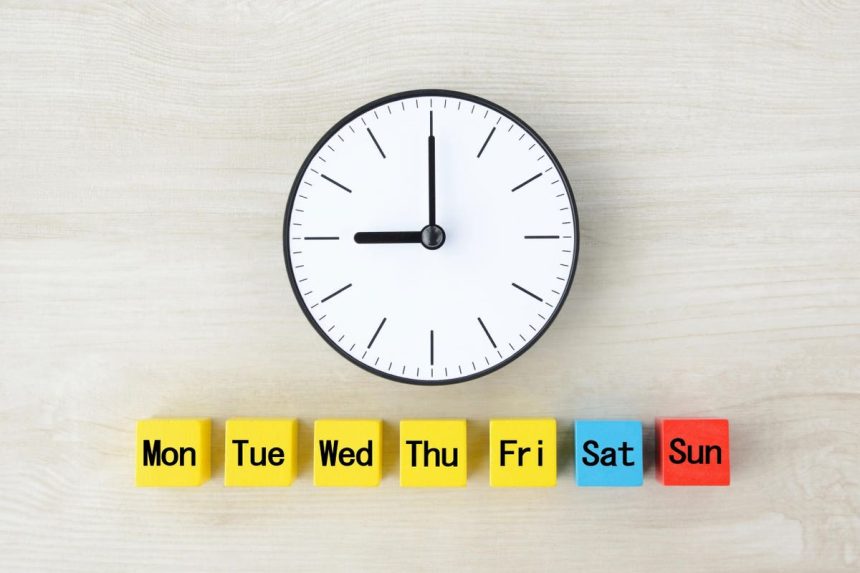The way work happens will never be the same—and as employees and organizations reassess and reset expectations, plenty of people are focused on productivity. To be your most productive—and to advance your career—you’ll want to consider when and where you work.
Unfortunately, not all days are created equal, nor are all times of day—and you may struggle with your effectiveness depending on when you’re trying to make work happen. It turns out Mondays and late afternoons are the worst days for stress, productivity and motivation.
Notably, 61% of employees surveyed by Deputy wish they were more productive. And 36% of people say their coworkers’ productivity is less than stellar, according to a poll by ClickUp.
But stats about patterns of work and the most optimal times for performance may help—as you reflect on what works best for you.
The Monday Struggle is Real
Mondays seem to be a particular problem as people report on their productivity. In fact, employees say they are 25% less productive on Mondays and 57% wish Monday could be part of the weekend. In addition, nearly 50% of people experience greater stress on Mondays. All of this is according to a poll by B2B Reviews.
Perhaps this is why most people say they would rather work from home on Mondays. In fact, among those who work hybrid schedules, only 40% work in the office on Mondays and 76% of hybrid workers say they would rather be in the office any day but Monday, according to the B2B Reviews poll.
People resist the office on Mondays because they say they have better work-life balance that way (43% of people), and that being home on Mondays better aligns with their personal or family schedule (31%). People also want to avoid the rush and chaos of Mondays (34%) and want a smoother transition from the weekend (27%).
Remote On Mondays?
It seems plenty of people can choose to work from home on Mondays. In fact, although 82% of workers were expected to be in the office part of the week, 71% were allowed to be remote at least once a week, according to data from Atlassian.
Unfortunately, remote work can be perceived as less productive—with a white paper from Stanford University finding that while employees thought they were 7.4% more productive, managers thought employees were 3.5% less productive working from home.
There may be some validity to the concerns, at least on Mondays. When people work from home the first day of the week, 75% reported to B2B Reviews that they begin work late. In addition, 54% said they stream shows while working, 50% get extra rest, 49% dedicate time to selfcare and 29% exercise.
And about 12% say they work only three hours or less on Mondays, according to B2B Reviews.
What Works Best
Other days of the week bode better for productivity, with 35% of respondents in the B2B Reviews poll saying they’re most productive on Tuesdays and 29% saying Wednesdays are their best.
People also find certain times of day to be most optimal. Based on data from Deputy, 9 a.m. to 11 a.m. is the most productive block while 3 p.m. to 5 p.m. is least productive. An academic study by Texas A&M University reinforces the challenges of later-day work, reporting people are less productive in the afternoons, and least productive on Friday afternoons.
In addition, most people admit to Deputy they can only be productive a handful of hours in a row. Gen Z and Millennials max out at just under five hours, Gen X at five hours and 22 minutes, and Boomers can work the longest—for about six hours consecutively.
Additionally, those at vice president and president levels report their consecutive hours worked were about four hours more—or 73% longer—than their associate-level counterparts.
When people aren’t working in the office, they’re set up in a variety of other locations. While 99% work from home, according to a poll by Upgraded Points, they also report they’re working from coffee shops (14%), friends’ homes (12%) and coworking spaces (4%). Some are also working from hotel rooms (12%), airports (6%) and airplanes (3%). And 3% of people say they work from the beach.
Consider When and Where to Work
To be your most productive, consider the type of work you need to get done and when and where you do it best. Generally, mornings are better for analytical and focused work, and afternoons are more optimal for creative work, but you’ll want to determine what works best for you and align your tasks accordingly.
You’ll also want to reflect on your own circadian rhythms. When your energy levels are highest, you’ll want to do the work you find most challenging or work which requires a lot of complex thinking.
In addition, being face-to-face in the office is often best for problem solving, collaboration and work for which there is a lot of urgency, according to research from Maastricht University and Erasmus University.
People also say they want to be in the office to have a sense of distance from home—to embrace a work-life boundary and to avoid doorbells, dogs or the distractions of home.
Also give thought to when you want to work independently and when you want to work together with others. While you can’t always control this, when you’re able to, it’s usually helpful. For example, if you get tired in the afternoon, and you’re energized by people, this could be a great time to schedule times to connect.
Consider Others
Consider your team and your organization as well. Your individual productivity is critical, but it’s also necessary to think about your group’s effectiveness—and this requires some synching up.
If you’re a hybrid team, you may decide to all be in the office on Tuesdays and Wednesdays so you can coordinate your work. Or consider the example of the IT team at a global manufacturing company who decided they would do all their focused work in the mornings and all their team meetings in the afternoons.
And of course your life outside of work will be a factor as well. If you have flexibility and can choose to catch your son’s soccer game or your daughter’s violin concert in the afternoon, and then plug in during the evening, you may prefer adjusting your schedule to meet both work and family demands outside the traditional hours of eight to five.
Work For Your Future
Ultimately, your best solution will be to build your self-awareness about what works for you so you can align your preferences with the needs of your teammates and your company. Commit yourself to great performance and productivity at the times when it’s optimal—and you’ll build your happiness and esteem in the process.
Read the full article here










